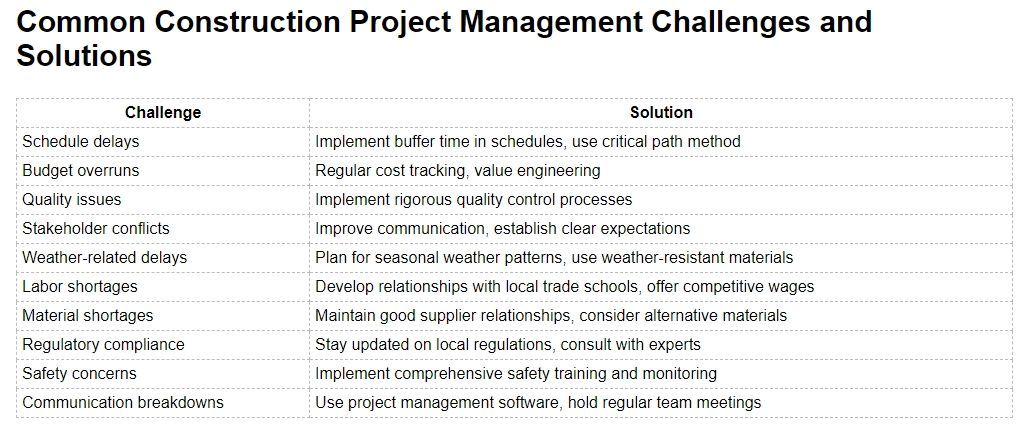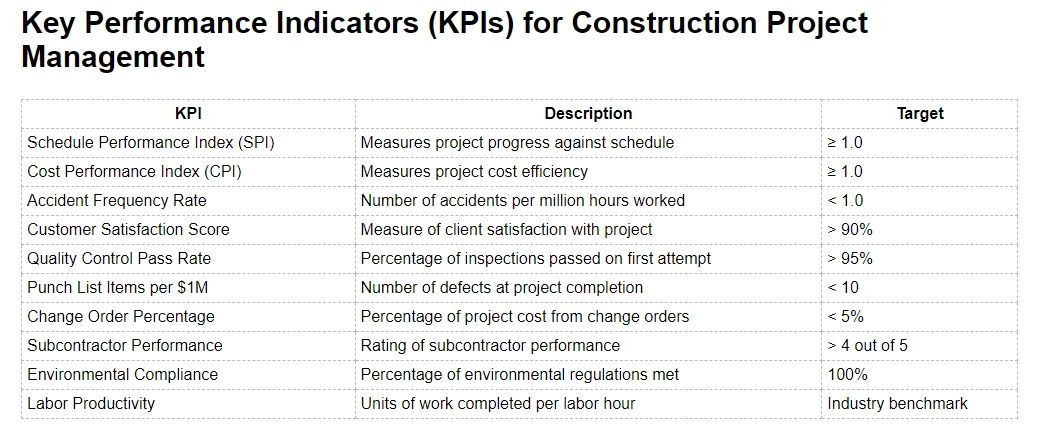Construction project management is the backbone of successful building endeavors, ensuring that projects are completed on time, within budget, and to the highest quality standards. It's a complex process that requires skill, experience, and careful planning to bring a project from concept to completion.
Key Takeaways:
- Construction project management involves overseeing all aspects of a building project from start to finish
- Effective management requires strong communication skills and attention to detail
- Risk assessment and mitigation are crucial components of successful project management
- Technology plays an increasingly important role in modern construction management
- Local regulations and environmental considerations are key factors in Bluffton, South Carolina projects
Understanding the Basics of Construction Project Management
Construction project management is the process of coordinating and overseeing all aspects of a building project. This includes everything from initial planning and design to the final handover of the completed structure. In Bluffton, South Carolina, construction managers must be well-versed in local building codes and regulations to ensure compliance throughout the project lifecycle.
The role of a construction project manager is multifaceted. They serve as the primary point of contact between clients, architects, engineers, and contractors. Their responsibilities include creating and maintaining project schedules, managing budgets, ensuring quality control, and addressing any issues that arise during construction.
One of the key challenges in construction project management is balancing the often competing demands of time, cost, and quality. This requires careful planning and the ability to make quick, informed decisions when unexpected problems occur.
The Project Lifecycle: From Concept to Completion
Every construction project follows a similar lifecycle, though the specifics may vary depending on the scale and complexity of the build. Understanding this lifecycle is crucial for effective project management.
Initiation Phase
The initiation phase is where the project concept is developed and feasibility studies are conducted. In Bluffton, this might involve assessing the suitability of a potential building site, considering factors like soil conditions and proximity to wetlands, which are common in the Lowcountry.
During this phase, the project manager works with the client to define the project scope, objectives, and deliverables. They also begin to identify potential risks and develop strategies to mitigate them.
Planning Phase
The planning phase is where the project really starts to take shape. This is when detailed project plans are developed, including timelines, budgets, and resource allocation. In Bluffton, this might involve coordinating with local suppliers and subcontractors who are familiar with the unique challenges of building in a coastal environment.
A critical part of the planning phase is creating a work breakdown structure (WBS). This document breaks the project down into manageable tasks and subtasks, making it easier to track progress and allocate resources effectively.
Execution Phase
The execution phase is where the actual construction work begins. During this phase, the project manager's role shifts to one of oversight and coordination. They must ensure that work is progressing according to plan, that quality standards are being met, and that any issues are addressed promptly.
In Bluffton, the execution phase might involve special considerations such as hurricane-resistant construction techniques or measures to protect local wildlife habitats.
Monitoring and Controlling Phase
The monitoring and controlling phase runs concurrently with the execution phase. This is where the project manager tracks progress, compares it to the original plan, and makes adjustments as necessary.
Key activities during this phase include regular site inspections, progress meetings with stakeholders, and updating project documentation. In Bluffton, this might also involve coordinating with local authorities for inspections and approvals at various stages of the build.
Closing Phase
The closing phase marks the completion of the construction project. This involves final inspections, obtaining necessary certifications, and handing over the completed structure to the client.
In Bluffton, the closing phase might include additional steps such as ensuring compliance with local environmental regulations or obtaining final approval from homeowners' associations, which are common in many of the area's planned communities.
Essential Skills for Successful Construction Project Management
Effective construction project management requires a diverse set of skills. Some of the most important include:
Communication Skills
Clear and effective communication is perhaps the most critical skill for a construction project manager. They must be able to convey complex technical information to a variety of stakeholders, from clients to contractors to local officials.
In Bluffton, where many construction projects involve custom homes or commercial buildings in planned communities, project managers must be adept at communicating with homeowners' associations and architectural review boards.
Technical Knowledge
While project managers don't need to be experts in every aspect of construction, they should have a solid understanding of construction techniques, materials, and industry standards. This knowledge helps them make informed decisions and effectively oversee the work of specialists.
In Bluffton, technical knowledge might include familiarity with coastal construction techniques, such as building on pilings to protect against flooding, or understanding the best materials to withstand the area's humid climate.
Problem-Solving Skills
Construction projects rarely go exactly as planned. Successful project managers must be able to think on their feet and come up with creative solutions to unexpected problems.
Leadership Skills
Project managers must be able to motivate and direct diverse teams of professionals. This requires strong leadership skills, including the ability to delegate tasks, resolve conflicts, and keep the team focused on project goals.
Technology in Construction Project Management
Technology is playing an increasingly important role in construction project management. Some key technologies include:
Building Information Modeling (BIM)
BIM software allows project managers to create detailed 3D models of buildings before construction begins. This can help identify potential issues early in the process and improve coordination between different trades.
Project Management Software
Specialized software helps project managers track schedules, budgets, and resources. Many of these tools offer real-time updates and collaboration features, allowing team members to stay informed and connected.
Drones
Drones are becoming a valuable tool for site surveys, progress monitoring, and safety inspections. In Bluffton, drones might be used to assess the impact of construction on sensitive wetland areas or to inspect hard-to-reach areas of tall buildings.
Local Considerations for Construction Project Management in Bluffton
Managing construction projects in Bluffton comes with its own unique set of challenges and considerations:
Climate Considerations
Bluffton's humid subtropical climate can impact construction schedules and materials choices. Project managers must plan for potential weather-related delays and ensure that materials and construction techniques are suitable for the local climate.
Environmental Regulations
Bluffton's proximity to sensitive coastal ecosystems means that environmental regulations play a significant role in many construction projects. Project managers must be familiar with local, state, and federal environmental regulations and ensure compliance throughout the construction process.
Historical Preservation
Bluffton has a rich history, and many areas of the town are subject to historical preservation regulations. Project managers working in these areas must be familiar with these regulations and work closely with local preservation committees.
Risk Management in Construction Projects
Risk management is a critical aspect of construction project management. Some key steps in the risk management process include:
- Identifying potential risks
- Assessing the likelihood and potential impact of each risk
- Developing strategies to mitigate or avoid risks
- Monitoring risks throughout the project lifecycle
- Responding quickly and effectively when risks materialize
In Bluffton, common risks might include weather-related delays, issues with soil stability, or challenges related to building in environmentally sensitive areas.
The Importance of Quality Control in Construction
Quality control is a crucial aspect of construction project management. It involves ensuring that all work meets or exceeds the required standards and specifications. Some key elements of quality control include:
Regular Inspections
Project managers should conduct regular site inspections to ensure that work is progressing as planned and meeting quality standards.
Documentation
Maintaining detailed records of all work performed, materials used, and any issues encountered is crucial for quality control and can help resolve disputes if they arise.
Training and Education
Ensuring that all team members are properly trained and understand quality expectations is an important part of quality control.
Third-Party Testing
For certain aspects of construction, such as concrete strength or soil compaction, third-party testing may be required to verify quality.
Sustainability in Construction Project Management
Sustainability is becoming an increasingly important consideration in construction project management. In Bluffton, where preserving the natural environment is a priority, sustainable construction practices are particularly relevant.
Some key aspects of sustainable construction include:
Energy Efficiency
Designing buildings to minimize energy consumption through features like proper insulation, energy-efficient HVAC systems, and smart lighting controls.
Water Conservation
Implementing water-saving fixtures and landscaping techniques that reduce water usage.
Sustainable Materials
Using environmentally friendly building materials and prioritizing locally sourced materials to reduce transportation emissions.
Waste Reduction
Implementing strategies to minimize construction waste and maximize recycling of materials.
The Role of Stakeholder Management in Construction Projects
Effective stakeholder management is crucial for successful construction project management. Stakeholders can include clients, contractors, local authorities, community members, and more. Some key aspects of stakeholder management include:
Identifying Stakeholders
The first step is to identify all stakeholders who may be affected by or have an interest in the project.
Communication Planning
Developing a plan for how and when to communicate with different stakeholders throughout the project lifecycle.
Managing Expectations
Clearly communicating project goals, timelines, and potential challenges to manage stakeholder expectations.
Addressing Concerns
Proactively addressing stakeholder concerns and incorporating feedback where appropriate.
Financial Management in Construction Projects
Financial management is a critical aspect of construction project management. This involves:
Budgeting
Developing detailed project budgets that account for all aspects of the construction process.
Cost Control
Implementing systems to track expenses and ensure the project stays within budget.
Cash Flow Management
Managing the timing of payments and expenses to maintain positive cash flow throughout the project.
Change Order Management
Carefully managing any changes to the project scope to avoid cost overruns.
Common Construction Project Management Challenges and Solutions

The Future of Construction Project Management
As the construction industry continues to evolve, so too does the field of construction project management. Emerging technologies like artificial intelligence and machine learning are beginning to play a role in project planning and risk assessment. Sustainability considerations are becoming increasingly important, driven by both regulatory requirements and client demands.
In Bluffton, South Carolina, construction project managers must stay attuned to these industry trends while also navigating the unique challenges and opportunities presented by the local environment. From preserving the area's natural beauty to building structures that can withstand coastal weather conditions, Bluffton's construction project managers play a crucial role in shaping the future of this charming Lowcountry community.
Successful construction project management requires a combination of technical knowledge, interpersonal skills, and strategic thinking. By mastering these elements and staying adaptable in the face of change, construction project managers can ensure the successful completion of projects that not only meet client expectations but also contribute positively to the built environment. For more information, you can visit our website or contact us.


